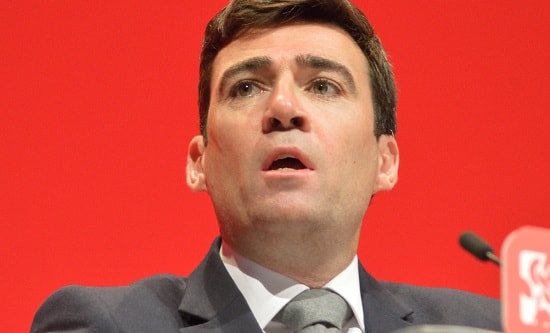
On 4 May 2017, to little surprise, Andy Burnham took his seat as the first Mayor of Greater Manchester, a position undemocratically forced upon the people of the city and its surrounding areas. Their adamant rejection of the role, decided in a local referendum in 2012, has been ignored. This is a compromise designed to solidify the power base of local leaders in return for complicity on a cruel austerity agenda. Burnham’s election on a turnout of 29% highlights general disillusion with the state of local politics in the region.
Burnham’s record in government as Health Secretary during the late Blair and Brown years betrays his core ideology: one of harsh austerity and policies of private subsidy over social investment. When in office as Health Secretary in 2009 he said the NHS had to find ‘efficiency savings’ of £15-20bn. On his watch Camden NHS signed off a £20m contract to Care UK, a private company with an atrocious record in elderly care. Another private company, Connect Physical Health Ltd, was given a lucrative NHS contract at Royal Free Hospital, leading to the axing of its physiotherapy services. Burnham also claimed expenses for mortgages on two homes, and defended Labour’s racist immigration policies when he stood for the party leadership in 2010.
In December 2016 Burnham spoke in parliament about immigration, cynically claiming that immigration had ‘made life more difficult’ and was ‘undermining the cohesion of our communities and the safety of our streets’. This racist rhetoric was clearly triangulating the Brexit demographic under a guise of ‘fairness’ to migrants and deprived areas. His speech was received favourably by Conservatives across the floor.
A key electoral pledge was the promise to end rough sleeping by 2020. This pledge has now been both endorsed and adopted by Corbyn for his general election campaign. Burnham’s plans include a token gesture of giving up 15% of his £110,000 mayoral salary, which will offer little comfort for the several hundred rough sleepers and temporary accommodation occupants forced onto Manchester’s streets. Other prospects include ‘emergency hubs’, which appear to consist of a temporary dormitory that will do nothing to solve the long-term immiseration of those who are forced to use them. Post-election, he has already avoided an opportunity to meet local squatters on a walkabout in the centre of Manchester; squatters who are currently staging a rooftop protest less than 500 metres from his new £4m office.
On housing, Burnham’s vision makes claims to promote the building of council-owned property. Interrogate further and in reality this boils down to introducing euphemistically-named ‘affordable’ housing. At market rates of 80% this will do little to alleviate the rapid social cleansing of the working class in areas of Salford; likewise with Manchester wards such as Levenshulme and Chorlton. Other policies touted in mayoral hustings and his manifesto include a voluntary regulatory scheme for private landlords and a focus on high rent inner-city developments.
On local education Burnham makes calls for Westminster to reduce austerity measures against schools in his area. However, in a blog entry on the Burnham For Mayor website the prospect of ‘Schools to be given the chance to host new business start-up units to build business-friendly culture’ again signifies him as a son of the pro-market and anti-socialist culture at the heart of Labour.
Another manifesto plan to ‘re-industrialise’ Manchester seems little more than a further exercise in commercial subsidy as he talks of ‘a business culture in all areas’. Details are thin but Burnham seems to be evoking George Osborne’s Northern Powerhouse concept, a policy of investment opportunities for the wealthy rather than anything for the working class.
Burnham’s first move as Mayor was to nominate Richard Leese as his deputy for Business and Economy. Leese has a long history in his position of leadership in the Labour local government spanning several decades. Rough sleepers in Manchester will recall the Leese council’s callous attacks on homeless camps in 2016 where council enforcement involved theft of their sleeping bags and tents. His legacy as Leader of Manchester City Council will be seen as one of channelling the public purse into private subsidies for commercial interests, and his remunerated directorial position with Peel Holdings subsidiary, Manchester Ship Canal Company Ltd, betrays the class interests at play. Burnham has so-far appointed three deputy positions worth £50,000 each to Manchester Labour councillors who are eager to retain their privileges as pressures on local government rise.
The day following the Mayoral election, Jeremy Corbyn was in Manchester looking to celebrate the win. However, when Burnham was nowhere to be seen on Corbyn’s platform, local reporters asked about his whereabouts. Corbyn replied that he ‘was already hard at work for the people of Greater Manchester’. Burnham was, in fact, in a local eatery for the well-to-do, sipping bubbly at £70 a bottle. Champagne socialism indeed.
Sam Evaskitas




